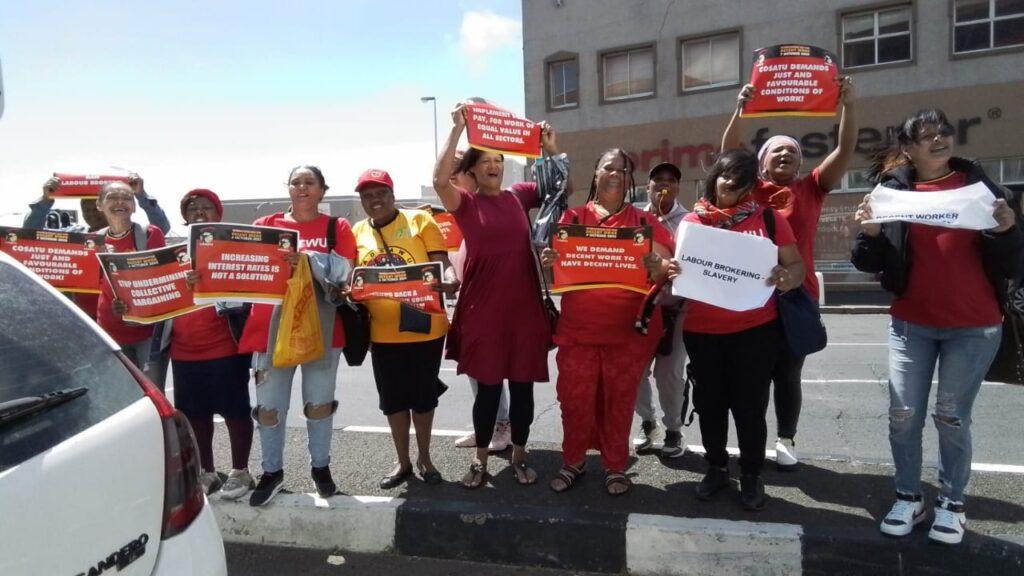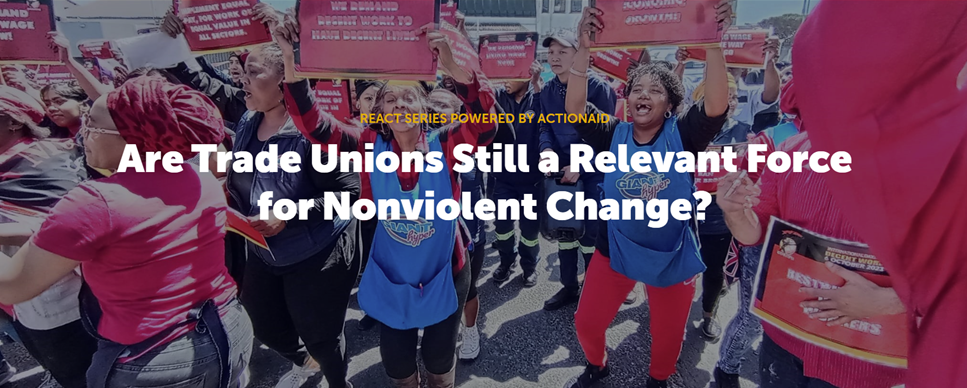Trade union membership worldwide has been on the decline for years, and my country, Kenya, is no exception. Does this mean trade unions are no longer relevant actors for social change? Can we no longer expect to see trade unions mobilizing and galvanizing society-wide nonviolent action as we saw in major episodes of nonviolent history like the Polish resistance to Communist rule and Chilean resistance to defeat dictatorship in the 1980s?
Across the globe, technological progress, demographic change and global competition are profoundly changing the world of work and challenging the mandate and role of trade unions. The dwindling unionized workforce in Kenya, however, is not only a result of the emergence and spread of neoliberalism and complex economic factors, but also a result of disunity and rivalry among local trade unions and their leaders. These splits have caused seemingly irreversible damage to solidarity and inclusiveness. Most important of all, the rarely discussed, deep-seated corruption within the ranks and files of trade unions contributes to disenchantment, especially among women and young people. These groups by and large see trade unions as ineffective and irrelevant in addressing their concerns or improving their working conditions.
More to the point, for decades, trade unions were a viable strategy for building strong and vibrant movements in Kenya. For example, they were involved in the fight against colonialism. However, taking into account the current closing of civic space in Kenya, we activists are confronted with the question, can trade unions still be a viable strategy in movement building?
In this blog post, I expand on two takeaways we can draw from past and present examples of labor organizing in Africa to argue that while trade unions may no longer be the force we used to be in Kenya, we could once again become such a force. And we can do so by reaching out to team up with other actors of social change, in particular local and national nonviolent movements (this is called “social movement unionism”); and by building a broader and more inclusive membership base, both in terms of recruitment and in social dialogue.

#1: Adopt the model of social movement unionism
Social movement unionism is a relatively new model of labor organizing in which workers' struggles are viewed as one of many vectors of political struggle and social change. Trade unions that practice this model seek horizontal alliances with social movements and partner with them in struggle. This was precisely the model of trade union organizing in pre-independence Kenya.
Social movement unionism involves both engagement with social justice struggles beyond the workplace and methods of union activity beyond the collective bargaining process. It increases the labor movement's organizing capacity, bargaining power and social and political weight. This organizing model is associated with labor movements of developing countries like the Congress of South African Trade Unions (COSATU), which has been in existence since 1994. COSATU has led, hosted and supported many successful campaigns which vary from labor-related issues to non-labor related issues.
To explore the advantages of this organizing model, we could start by collaborating and working with different actors like cooperatives, local movements and other civil society members to organize nonviolent campaigns and leverage people power for interests beyond workers’ rights and workplace issues.
We can also engage in other political struggles for human rights, social justice and democracy in our region. For example, in 2018, I participated in the “Powerful Flower Worker” campaign, which promoted labor and health rights in the floriculture industry in neighboring Uganda. We worked to expose the health rights violations at flower farms, documenting stories of victims, demanding justice and health services from service providers of victims’ choice at the cost of the employers. We also mobilized and built the capacity of workers to participate in organized labor. In that project, I produced a curriculum on labor power for a new Africa.
Social movement unionism derives power from building unity across struggles, which means sharing successes but also failures. The year before I joined this campaign, the Uganda Horticulture Industrial Service Providers and Allied Workers Union (UHISPAWU), which was part of this campaign, called for a boycott of commercially farmed flowers on the market. They encouraged consumers to opt for wildflowers until farm workers were given adequate protective equipment. The boycott was successful in pushing through a 10 percent wage increase for flower workers, but not all farms implemented the measure, which demonstrates a real need to keep the pressure on single farms even, and that takes significant mobilization.

#2: Build a broad and inclusive membership base
As the International Labour Organization (ILO) highlighted in 1997, despite the numerical decrease in trade union membership, “Trade unions continue to play an important role as vehicles of democracy and advocates of social justice, notably by reaching out to women, minorities, consumer groups, the unemployed and the growing numbers of working poor in countries around the world."
Although I cannot say this is true about trade unions and their leaders in Kenya, I can offer an example of how trade unions can partner with other local initiatives to build broader and more inclusive participation. From 2012 to 2019, several East African labor unions partnered with a campaign called Women@Work, spearheaded by Hivos. The campaign sought to secure fair wages and better working conditions for women in global horticulture supply chains. Through advocacy, supporting artivism and more, Women@Work pressured for the adoption and enforcement of policies in favor of women workers. Securing seats for women workers in social dialogue was a central feature of this campaign.
The campaign served as a platform for labor unions to be active partners pushing for, and ultimately securing significant salary increases, promotions and improved working conditions for women in Kenya and other countries.
-
The decline of labor union influence here is part of the broader trend of closing civil society space. Government institutions and people in positions of power in Kenya are systematically targeting trade unions in an attempt to weaken the latter’s influence. Workers are operating in an environment that is hostile to unionization, with less and less strength to bargain collectively as real wages and working conditions continue to erode.
We, Kenyan trade unions, must prioritize creating space—or perhaps more feasibly, joining initiatives that create space for—more diverse and inclusive social dialogue. We must also explore new collaborations with nonviolent movements and other social change actors. These are just a few ways trade unions can fight back against the eroding civic space in our country and become champions for building strong and vibrant movements once again.

